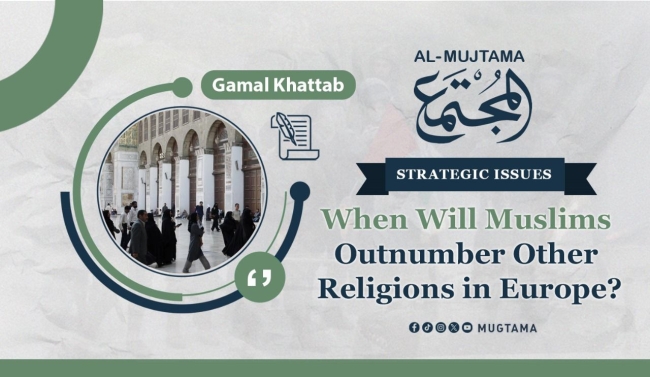When Will Muslims Outnumber Other Religions in Europe? Featured
The Islamic presence in Europe has emerged as a major concern for European opinion leaders and decision-makers due to data-driven fears of an Islamic invasion and intimidation efforts by political and intellectual extremists.
Nilufer Gul, a sociology professor, posits in her book "Islam and Secularism" that Europe's future and democracy rely on its capacity to surmount identity politics and the challenges linked to Muslim immigrants.
The increasing presence of Islam in Europe is causing fears that are spreading across the continent, both officially and among the general population, leading to a state of fear and panic against Islam and Muslims.
This led to the creation of numerous laws and rulings banning the hijab, the Islamic call to prayer, and mosques, as well as other actions that impede Muslims, particularly their religious rights, despite the significant level of freedom in Europe.
The anxiety about Islam extends beyond just this state, including banning activities supporting Muslim causes. This has been evident since the start of the recent attacks on Gaza, with numerous protests and events against Israeli offenses being restricted in various European cities.
According to Researcher Nilufer Gul, Europe's relationship with Islam is now clearly defined due to the growing incidents of harassment and discrimination against Muslims and the emergence of right-wing political movements.
Estimations for the Future
Projected figures suggest that by the middle of this century, Muslims will make up one-fifth of the European Union's population, in line with a report by the American Pew Research Center forecasting that by 2050, Muslims will account for 20% in Germany, 18% in France, and 17% in Britain.
In 2019, a study by Pierre Rostan and Alexandra Rostan was released with the title: "At what point will the European Muslim population become the majority and in which specific country?"
The research, spanning 30 European nations, determined that under the most probable conditions, Muslims are projected to make up the majority of the population in Sweden, France, and Greece in approximately 100 years. The transition is expected to occur around 115 years in Belgium and Bulgaria, and around 150 years in Italy, Luxembourg, and Britain.
In an interview with the Austrian Express newspaper, the ex-leader of the German Federal Office for intelligence, Hans-Georg Maassen, affirmed these predictions. He stated that by 2200, the majority of Europe's population will be Muslim, cautioning against the encroachment of a foreign culture that could erode European traditions.
Data that is up to date.
Obtaining precise information on the current Islamic population in Europe is challenging due to various factors such as the prohibition of conducting religious-based censuses in some European countries like Sweden, as well as the rising and unregulated interest in converting to Islam.
The highest proportion of Muslims in the major European nations is believed to be in France. A study from the French Institute of Statistics and Economic Studies in June 2023 shows that 10% of French people identify as Muslims, although other reports suggest this number could be as high as 15%.
Estimates in other European nations show lower percentages compared to those in France. In Sweden, the Muslim population is estimated to be over 8%, while in Belgium, Britain, the Netherlands, and Germany it is around 7%, and in Spain, Denmark, and Italy it is close to 6%.
The Existence of Islamic Influence
Multiple significant factors suggest that the Islamic influence in Europe is increasing, with its growth projected to accelerate in the upcoming years and decades. Included in these factors are:
Increase Compared to Decrease
A January 2023 report from "The Telegraph" confirmed alterations in the religious identity of the population on the European continent.
The newspaper described how there has been a rise in Muslim immigrant communities and birth rates in Europe, contrasting with a decrease in birth rates among the native population.
The data demonstrates a significant contrast in birth rates between the indigenous population at around 1.5% in Germany and the new Muslim population reaching up to 8.1%.
Researchers specializing in demographics assert that the transformation occurring in Europe is notable and is expected to multiply within the span of several decades. This is because Europeans are also susceptible to population decline as fertility rates decrease.
Transformation Versus Alteration.
The increase in popularity of Islam in Europe is being accompanied by a decline in Christian faith or apostasy in Europe. In 2021, a study in Britain discovered significant and never-before-seen changes in English society. Although fewer people are stating that they identify with Christianity, there is an increase in the number of people claiming they follow the religion. Number of individuals who stated they have converted to Islam.
This fact is known that a significant portion of Europeans do not have any debts, making up, for instance, 37% of the population in the UK.
Churches Vanish, Mosques Increase.
The increasing Islamic presence in Europe is evident in the decline of churches and their substitution with mosques in several locations. As European Christians' attention towards their churches wanes, Muslims are actively constructing mosques and acquiring abandoned churches to convert them into mosques.
Instances of this phenomenon include the conversion of the Johannes Church in Dortmund, Germany, into the Dortmund Center Mosque by Muslims, and the construction of the Al-Fatih Mosque in Amsterdam, Netherlands, on the site of a former church.
The Dominican Church in Lille, France, has been transformed into a mosque, while in Britain, there are close to two thousand mosques, the majority of which were formerly churches.
A report from the French Public Opinion Institute indicated that just 4.5% of the French population regularly attends churches, whereas 515 churches in Germany were shut down in the past decade due to declining interest in religion.


